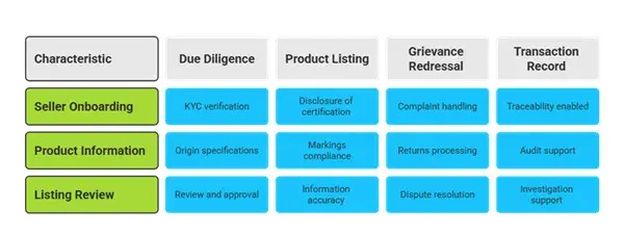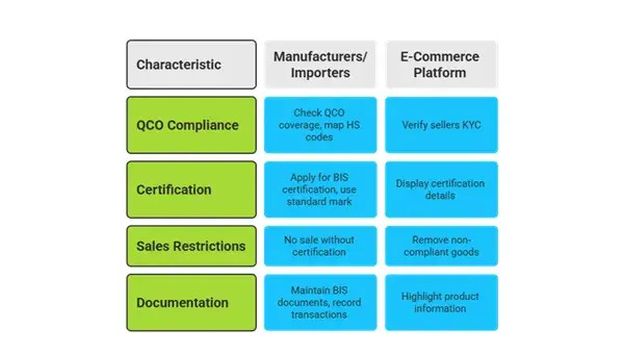- within Consumer Protection topic(s)
- in United States
- in United States
- within Environment, Litigation, Mediation & Arbitration and Technology topic(s)
- with Senior Company Executives, HR and Inhouse Counsel
- with readers working within the Law Firm industries
BIS Compliance for E-Commerce Platforms
In March 2025, the Bureau of Indian Standards (BIS) undertook enforcement actions1 at storage facilities associated e-commerce giants. These actions involved the seizure of products that, as per BIS, fall under the scope of Quality Control Orders (QCOs) but were being stored or offered for sale without the requisite certification.
The developments come at a time when the regulatory framework governing product compliance is evolving, with greater emphasis on ensuring adherence not just at the point of manufacture or import, but also across distribution and retail channels, including online marketplaces.
Role of BIS and Legal Framework
The Bureau of Indian Standards is the national standards body responsible for developing Indian Standards and overseeing their implementation under the BIS Act, 2016. The Act authorises BIS to issue licences and certificates of conformity for goods, systems, processes, and services, and enables it to enforce compliance through inspections, seizures, and prosecution where applicable.
Where a product is notified under a Quality Control Order (QCO), its manufacture, import, sale, or storage without BIS certification is expressly prohibited under Section 17 of the Act. Importantly, the law applies to "any person" involved in these activities, a term defined broadly to include manufacturers, importers, distributors, retailers, sellers, or any person who applies their name or brand to a product.
Key Provisions from the BIS Act, 20162:
|
Section |
Summary |
Implications |
|---|---|---|
|
Section 16 |
Central Government may notify goods or services requiring compulsory BIS certification |
Notification brings specified products under mandatory compliance |
|
Section 17 |
Prohibits manufacture, import, distribution, sale, or storage of such goods without certification |
Applicable to all persons in the supply and retail chain |
|
Section 29(3) |
Penalty for violation includes imprisonment and/or fine up to ten times the value of the goods |
BIS may pursue financial recovery and prosecution |
|
Section 31 |
Requires compensation to consumers where certified goods fail to meet standards |
Includes liability for injury or loss caused by non-conforming goods |
The enforcement measures taken in March 2025 are therefore consistent with the BIS's statutory mandate, where goods found to be uncertified under a QCO may be subject to seizure, and the relevant parties may be liable under the Act.
Certification Responsibilities and Platform Operations
In the traditional compliance model, primary responsibility has rested with the manufacturer or importer. However, with digital commerce becoming a key channel for consumer sales, the operational role of e-commerce platforms has grown. Depending on the structure of the platform whether it follows an inventory-led or marketplace model, various compliance responsibilities can arise.
For instance, where platforms offer warehousing, logistics, or "fulfilled by" services, they may assume functions similar to that of a distributor. In such contexts, if notified products are stored or offered for sale without certification, the relevant entity may fall within the ambit of Section 17. Similarly, where platforms exercise control over listings, pricing, and product display, their role may go beyond that of a passive intermediary.
To provide clearer guidance on this aspect, BIS released a Draft Indian Standard titled E-Commerce – Principles and Guidelines for Self-Governance in January 20253. Though not yet final, the draft outlines principles that are relevant to e-commerce platforms operating in India.

While the draft standard does not carry statutory force, it reflects the evolving regulatory approach encouraging platforms to adopt preventive practices and maintain visibility over the compliance status of goods sold through their infrastructure.
Quick Compliance Checklist for Businesses and Platforms

Conclusion
The actions by BIS in relation to uncertified goods found at e-commerce warehouses highlight the agency's ongoing efforts to ensure full implementation of QCOs across all distribution channels.
As India continues to expand its standards regime in the interest of consumer safety and quality assurance, businesses including platforms must include system-level changes, compliance integration in seller onboarding, automated product flagging for QCO categories, and display protocols for certification. Given the frequency with which BIS is expanding QCO coverage, staying ahead of these regulatory expectations will be essential.
Pratham Mathe, Intern at S.S.Rana & Co. has assisted in the research of this article.
Footnotes
1. https://ssrana.in/articles/bis-raid-on-e-commerce-godowns-legal-implications-compliance-measures/
2. https://www.bis.gov.in/wp-content/uploads/2020/12/BIS-Act-2016.pdf
The content of this article is intended to provide a general guide to the subject matter. Specialist advice should be sought about your specific circumstances.


